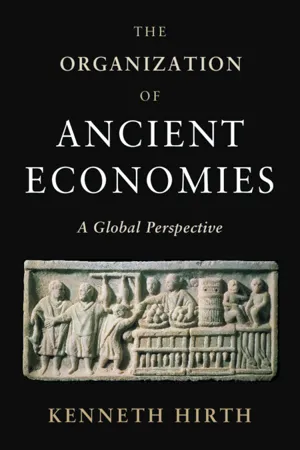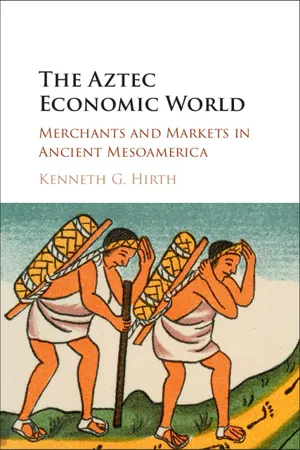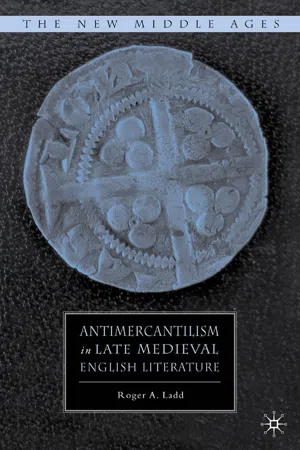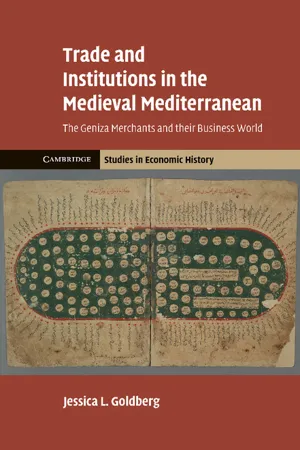History
Merchants
Merchants are individuals or groups who engage in the buying and selling of goods and services. Throughout history, merchants have played a significant role in the development of trade and commerce, often establishing trade routes and networks that spanned vast distances. They have also been instrumental in the growth of cities and the spread of cultural exchange.
Written by Perlego with AI-assistance
Related key terms
1 of 5
4 Key excerpts on "Merchants"
- eBook - PDF
The Organization of Ancient Economies
A Global Perspective
- Kenneth Hirth(Author)
- 2020(Publication Date)
- Cambridge University Press(Publisher)
A merchant in general terms is an individual who participates and assists in resource provisioning within society 194 as an aspect of their livelihood. The merchant is an agent dedicated to the procurement, movement, and exchange of goods. The more vital resource movement is in meeting provisioning needs, the more important the role of merchant traders becomes within society. From a developmental perspective, Merchants appeared when informal trading relationships and trade partner arrangements were insufficient for moving the quantity of goods needed or desired across the landscape. Likewise, an economic system can be said to increase in its level of commercialization as the number of goods moving through exchange rises in frequency and more people become dependent on exchange for the resources they consume. This chapter explores the role of Merchants, the conditions that gave rise to their appearance, and some of the ways that merchant trade was organized and carried out in the ancient and premodern past. Merchants were important for the development of maritime societies such as Venice and Phoenicia. While a merchant could operate as an individual, they commonly self-organized and operated through a series of informal and voluntary institutions that helped them transact business and exchange goods both inside and outside their local, ethnic, and religious communities. WHO IS A MERCHANT? Webster’s New World Dictionary (1968) defines a merchant as an individual whose livelihood or business is buying and selling goods for profit – in short, a person involved in professional trade. While this definition was based on 20th-century views of the economy, it is simple, to the point, and applicable to a discussion of merchant behavior in the ancient world. - eBook - PDF
The Aztec Economic World
Merchants and Markets in Ancient Mesoamerica
- Kenneth G. Hirth(Author)
- 2016(Publication Date)
- Cambridge University Press(Publisher)
Websters New World Dictionary (1968) defines the merchant as an individual involved in “buying and selling goods for profit.” This defin- ition is simple, to the point, and emphasizes the merchant’s function as a purveyor of goods for economic gain. It is a good place to initiate the discussion of what constitutes a merchant because it highlights three fundamental characteristics: the merchant as agent, the merchant as profiteer, and the merchant as trade intermediary. The first of these three features is that Merchants are specialized exchange agents who operate as individuals in the true sense of the word. Commodities do not appear on their own. They have to be found or produced, processed into usable forms, and taken to the marketplace for sale. Merchants make the decisions to buy and sell goods, and take the associated risks largely as individuals. 8 While they may be organized into guilds and share information through formal associations, the decisions to invest, trade, buy, and sell were often made individually at the point of purchase. This was especially the case in antiquity where information on supply and demand was very limited. Like shoppers in a modern super- market or a trader on Wall Street, sale and purchase decisions are based on information, timing, experience, and expectations of future returns or losses. It is here that we can talk about merchant skill when decisions are good, and commercial risk when decisions are bad. The second important feature of Webster’s definition of a merchant is that it is someone “who profits” from the exchanges made. The concepts of profit and profit motivation are controversial topics within Anthropology. Not only are they difficult to define and measure, but there are many social reasons why individuals engage in exchange beyond simple economic ones. I follow Gudeman (2001) who views profit simply as the creation of value. - R. Ladd(Author)
- 2010(Publication Date)
- Palgrave Macmillan(Publisher)
CHAPTER 1 AN INTRODUCTION TO LATE MEDIEVAL ENGLISH LITERARY Merchants P owerful commoners in an age of aristocrats, international operators in an age of dangerous travel, city-dwellers within a predominantly rural population: Merchants were a paradox in medieval society, and wielded power and influence far in advance of their social status. Literary scholars have only recently started to give Merchants the attention they deserve, and while much work has been done by historians of the medi- eval economy, to date only a few historical studies have been dedicated entirely to English Merchants as a social group. Literary scholarship rarely focuses directly on Merchants outside the work of Geoffrey Chaucer or the York Mercers’ Play. 1 Some recent work has been done on the intel- lectual history of the concept of trade, but no one has undertaken a com- parative study of the position of Merchants in late medieval English literature, and this book begins to fill that gap. 2 While I suspect that much scholarly aversion to Merchants arises from class-guilt on the part of scholars who desire to launder our own middle-class origins, the sim- plicity and descriptive power of the three-estates model itself have enabled its dominance as a paradigm. If we imagined that the three estates were a universal ideology of the Middle Ages, reliance upon that model might at least seem true to period values, but Georges Duby argues convincingly that the ideology of the three estates was never universally descriptive, but was instead a contingent social model created for France around the year 1000. 3 It is the lasting ideological power of this imagined social structure that impinges on my study of literary representations of mer- chants, their sins and virtues. Despite the historical contingency of the three-estate theory, it is remarkable how it still permeates the study of medieval literature, and not just that of estates satire.- eBook - PDF
Trade and Institutions in the Medieval Mediterranean
The Geniza Merchants and their Business World
- Jessica L. Goldberg(Author)
- 2012(Publication Date)
- Cambridge University Press(Publisher)
Most of this chapter explores the mechanics of the business life exemplified by Yu ¯suf, Farah ˙ , and Ibrahı ¯m. A shorter section introduces the goods Merchants dealt in; a longer one examines the transactions their trade involved. The central focus of these sections is to consider the actual work of Merchants. By this I mean both the kinds of specialized commercial services Merchants provided and the role they played in the economy. Such an analysis in turn tells us something about the overall organization of the commercial economy. In the conclusion I return to the question of the risks that Ibrahı ¯m and his colleagues were and weren’t willing to assume, and the relationship between risk and mercantile work. 4.2 The mix of commodities It is easy to conjure up an image of the medieval merchant: he carries gold, spices, rich brocades, and jewels vast distances on camels and ships; he heads a train of chests bursting forth their ropes of pearls. Our imagination borrows from the medieval one: fourteenth-century Cairo gives us the best-known version of the 1001 Nights with its visions of columns of treasure-laden camels; at nearly the same time Boccaccio writes tales of men lost at sea clinging to chests that turn out to be filled with jewels. 6 The precious bundle Ibrahı ¯m lost in Agrigento shows the kernel of truth in these tales, but the skins of Ifrı ¯qiyyan oil he actually managed to send to Alexandria let us know that we have missed a great deal of the story if we imagine that these Merchants dealt exclusively or even principally in luxuries from far away, or if we think their role in the economy involved only camels and ships – that they were middlemen moving foreign goods. In one sense, Geniza Merchants fit the pattern of medieval Merchants generally – they dealt in a large number and wide range of goods.
Index pages curate the most relevant extracts from our library of academic textbooks. They’ve been created using an in-house natural language model (NLM), each adding context and meaning to key research topics.



